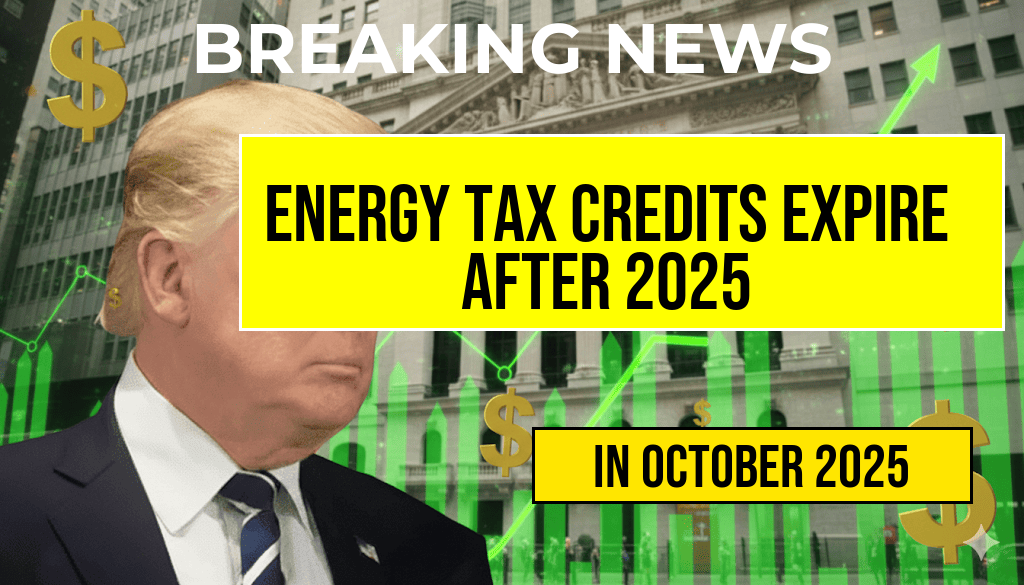As the deadline for residential energy tax credits approaches, homeowners and industry experts are raising concerns over the potential implications for green energy adoption in the United States. Currently, these credits, which provide significant tax breaks for solar, wind, and other renewable energy installations, are slated to expire after 2025. This shift away from incentives could hinder the momentum gained in the renewable energy sector and deter homeowners from pursuing eco-friendly upgrades, according to several analysts. With climate change remaining a pressing global issue, the reduction of financial support for residential green energy solutions raises questions about the future of sustainable living in America.
Current Landscape of Energy Tax Credits
The federal government has long supported green energy initiatives through various tax credits aimed at promoting renewable energy sources. The most notable of these is the Investment Tax Credit (ITC), which allows homeowners to deduct a percentage of the cost of solar energy systems from their federal taxes. As of 2023, this credit covers 30% of the installation costs for solar power systems, providing a significant financial incentive for homeowners to transition to renewable energy.
Impending Expiration and Its Ramifications
With the expiration of these tax credits set for December 31, 2025, many homeowners are now racing against the clock to complete their renewable energy installations. According to the Forbes Advisor, the uncertainty surrounding the future of these credits has led to increased demand for solar installations. However, experts warn that the end of these incentives could lead to a sharp decline in the adoption of renewable energy solutions.
Potential Impact on Homeowners
- Increased Costs: Without the tax credits, homeowners may face a significant increase in the upfront costs of solar and other renewable energy systems.
- Decreased Adoption Rates: The absence of financial incentives could lead to lower installation rates, reversing years of growth in the green energy sector.
- Long-term Environmental Effects: Reduced adoption of renewable energy may slow down efforts to mitigate climate change and reduce carbon emissions.
Industry Responses and Future Prospects
In light of the impending expiration, several industry advocates are calling for the extension of these tax credits. Organizations such as the Solar Energy Industries Association argue that maintaining financial incentives is crucial for sustaining growth in the renewable energy market. They emphasize that continued support for residential energy tax credits is essential for achieving national energy goals and transitioning to a cleaner economy.
Some states are stepping up to fill the potential gap left by the federal expiration of tax credits. Programs at the state level are being developed to offer alternative incentives, such as rebates and grants for homeowners who invest in renewable energy systems. However, these state-level programs may vary significantly, leading to unequal access and support across different regions.
The Role of Legislation
As discussions around energy policy continue, lawmakers are being urged to consider the long-term implications of allowing residential energy tax credits to expire. Potential legislation could focus on not only extending current credits but also expanding incentives to other forms of renewable energy, such as geothermal and energy storage solutions. The National Renewable Energy Laboratory (NREL) has highlighted the importance of such policies in promoting an equitable energy transition.
Conclusion: A Critical Crossroads
The impending expiration of residential energy tax credits after 2025 represents a critical juncture in the U.S. energy landscape. While the renewable energy sector has seen significant advancements and growth over the past decade, the potential withdrawal of financial incentives poses challenges that could stall progress. As homeowners, industry stakeholders, and policymakers grapple with these changes, the future of green energy in America remains uncertain. The outcome of these developments will not only affect individual homeowners but will also play a significant role in shaping the country’s environmental trajectory for years to come.
Frequently Asked Questions
What are the Residential Energy Tax Credits?
The Residential Energy Tax Credits are incentives provided by the government to encourage homeowners to invest in energy-efficient systems and technologies, such as solar panels and energy-efficient appliances.
When do the current Residential Energy Tax Credits expire?
The current Residential Energy Tax Credits are set to expire after 2025, prompting concerns about the future of green energy incentives.
Why are green energy incentives important?
Green energy incentives play a crucial role in promoting the adoption of sustainable technologies, helping to reduce carbon footprints and combat climate change.
What changes can we expect after the expiration of these credits?
After the expiration of the Residential Energy Tax Credits, homeowners may face higher costs for energy-efficient upgrades, potentially slowing the growth of the green energy sector.
Are there any alternatives to the Residential Energy Tax Credits?
While the Residential Energy Tax Credits may expire, homeowners can explore other financing options, local incentives, and rebates that may still support energy efficiency projects.

Leave a Reply